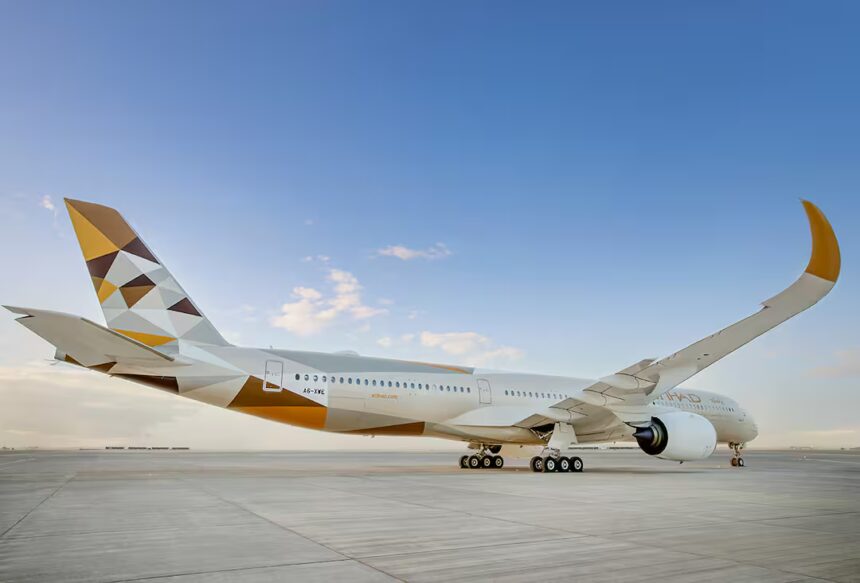Etihad Airways, Abu Dhabi’s flagship carrier, has officially welcomed the latest addition to its growing fleet – the state-of-the-art Airbus A350. This new aircraft marks another significant step in the airline’s ongoing commitment to innovation, fuel efficiency, and elevated passenger experience. As one of the most advanced wide-body jets in the world, the A350 is set to enhance Etihad’s long-haul operations while reinforcing its sustainability goals.

Etihad to Expand Fleet with Airbus A350
Etihad Airways announced Monday that it has welcomed its sixth Airbus A350, further expanding its next-generation fleet. The state-of-the-art aircraft touched down in Abu Dhabi over the weekend following a successful delivery flight from Toulouse, France.
This addition reinforces Etihad’s commitment to operating one of the youngest and most fuel-efficient fleets in commercial aviation. The Airbus A350 aircraft is widely known for its advanced fuel efficiency, this is partially a result of its airframe, which is constructed with more than 50% composite materials. This aids Etihad in acquiring its set sustainability goals in line with the ICAO (International Civil Aviation Authority) to achieve net zero carbon emissions by 2050. The aircraft boasts 25 percent lower CO₂ emissions and a 50 percent smaller noise footprint compared to previous-generation wide-body aircraft.
Designed for long-haul journeys, the aircraft offers a superior passenger experience as fitted by Etihad. Business Class cabins feature privacy-focused sliding doors, wireless charging, and cutting edge inflight entertainment systems. In Economy Class, passengers enjoy ergonomic seating, device holders, and Bluetooth connectivity, enhancing comfort throughout the journey.
While the A350 has proven successful among airlines and passengers alike, Airbus has faced ongoing headwinds in scaling up production and meeting delivery targets. Global supply chain disruptions, including shortages of engines and critical components, have impacted the pace of A350 deliveries. In response, Airbus revised its 2024 delivery forecast and is reportedly expecting delays in the freighter variant of the A350, now anticipated to enter service in 2027.
Airbus’ competitor, Boeing, appear to be amidst a slump too with high clientele threatening to switch to alternative aircraft manufacturers. This indicates that the manufacturers are only just coming back after the pandemic and are still continuing in a recovery stage.
Despite these industry-wide challenges, Etihad’s continued investment in modern, efficient aircraft like the A350 signals strong confidence in sustained passenger demand and the airline’s future growth trajectory.

Who are Etihad?
Etihad Airways is the national airline of the United Arab Emirates, based in the capital city of Abu Dhabi. Since its founding in 2003, Etihad has rapidly grown into one of the world’s leading premium carriers, known for its exceptional service, innovation, and commitment to sustainability.
The airline operates an extensive global network, connecting Abu Dhabi to major destinations across the Middle East, Europe, Asia, North America, and beyond. As part of its long-term strategy, Etihad continues to invest in modern, fuel-efficient aircraft, aiming to reduce its environmental impact while enhancing the passenger experience.
What do you think of Etihad? Let us know below!









